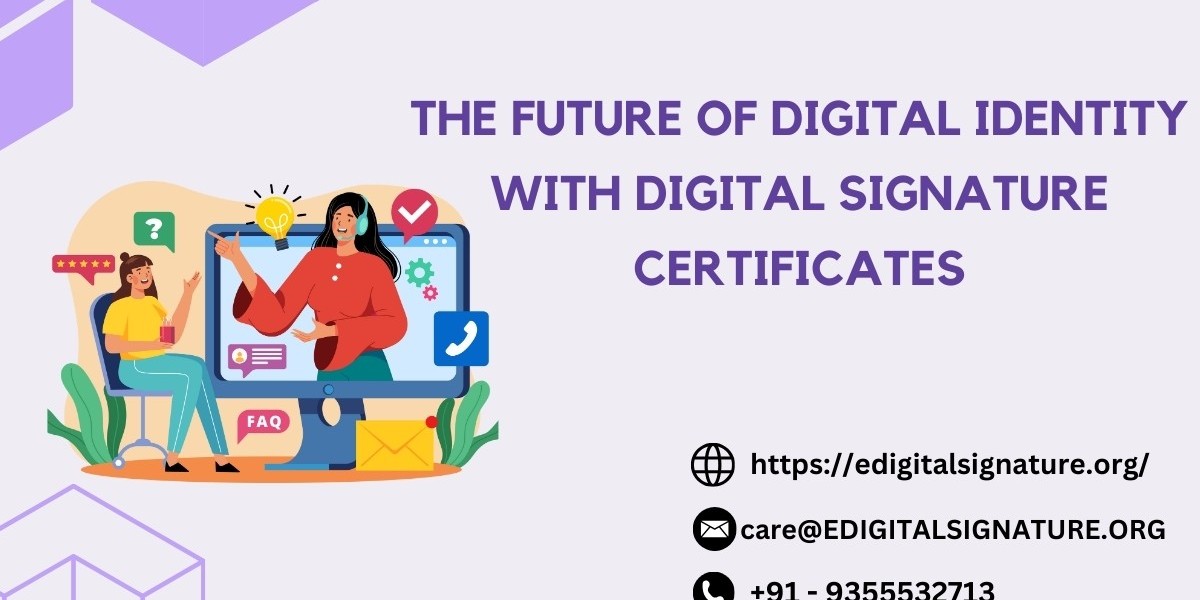A Digital Signature Certificate (DSC) is an electronic credential issued by a certifying authority (CA) that verifies the identity of an individual or organization. Like a passport or driver's license in the physical world, a DSC validates the holder’s identity in digital environments. These certificates are issued after a rigorous identity verification process, which includes cross-checking official documents and verifying identities to ensure legitimacy.
A DSC contains essential information such as the user’s public key, details of the issuing certifying authority, a unique serial number, and the certificate's expiration date. The public key included in the DSC is used to encrypt messages or documents sent from the certificate holder, while the corresponding private key is known only to the holder and used to decrypt data received. This ensures that only the intended recipient can access the content, maintaining both authenticity and confidentiality in digital transactions.
The Role of Digital Signature Certificates in Establishing Digital Identity
Digital identity is increasingly defined by the credentials individuals and organizations use to access online services and validate their actions. DSCs play a crucial role in establishing a verified digital identity by linking an individual or organization’s identity to their digital signatures. This linkage is maintained through cryptographic methods, with public and private keys ensuring that data cannot be altered without detection. When a digital signature is attached to a document, it assures the receiver of both the sender’s identity and the integrity of the content.
Digital Signature Certificates verify identity across a variety of online activities:
E-Government Services:
Many government portals require DSCs to access services like tax filing, company registration, and obtaining licenses. This ensures that only verified users can perform sensitive actions, maintaining the security and reliability of government services.
E-Commerce and Financial Transactions:
Online banking, e-commerce platforms, and payment gateways often employ DSCs to prevent unauthorized transactions and enhance customer trust. For instance, e-banking services might require DSCs to validate user identities before transactions are completed, minimizing fraud risks.
Remote Work and Virtual Interactions:
DSCs have enabled secure document sharing, project collaboration, and virtual meetings in professional environments. As remote work and digital nomadism grow, DSCs have become essential for businesses to verify employees, clients, and partners in various digital interactions.
How DSCs Enhance Security in Digital Identity Management
DSCs contribute significantly to the security of digital identity management by ensuring the following:
Authenticity:
A DSC assures the recipient that the message, document, or transaction is genuinely from the claimed sender, as it is cryptographically signed and cannot be easily forged.
Data Integrity:
Digital signatures validate the content’s integrity by verifying that no modifications have occurred after the document or message was signed. This is crucial in maintaining the trustworthiness of digital transactions, as any tampering will invalidate the signature.
Non-Repudiation:
DSCs prevent the sender from denying their involvement in a digital transaction, as the unique digital signature verifies the identity and intentions of the signer. This feature is critical in legal contracts, financial transactions, and other sensitive activities.
Encryption and Confidentiality:
DSCs often work in tandem with encryption to protect sensitive information. By encrypting data, DSCs ensure that only authorized recipients can access or read the content, enhancing privacy in communications.
How to apply for Digital Signature?
Visit the Website:
Go to edigitalsignature.org.
Fill Application Details:
Choose User Type, Class Type, Certificate Type, and Validity, and provide personal details.
Choose Token Option:
Select "Yes" if you need a token, or "No" if you already have one.
Make Payment:
Pay the application fee online (Net Banking, Credit/Debit Card, UPI).
Receive DSC:
Submit the application, and your DSC will be sent on an encrypted Pen Drive via post.
The Impact of DSCs on Digital Transformation
The adoption of DSCs supports digital transformation in various sectors, contributing to more efficient, transparent, and secure digital operations.
Government Services and Public Administration:
Many governments worldwide have introduced e-signature initiatives that require DSCs to access public services. This not only reduces paperwork but also makes government services more accessible, efficient, and secure for citizens.
Healthcare:
Digital identities secured through DSCs are essential in healthcare, where patient data privacy and authenticity are critical. DSCs allow healthcare providers to securely store and share medical records, ensuring that sensitive patient information remains confidential and unaltered.
Banking and Financial Services:
Financial institutions are adopting DSCs to secure digital banking services, allowing customers to conduct transactions safely. By using DSCs, banks can verify identities, protect transaction data, and prevent identity theft.
Education:
Academic institutions are increasingly using DSCs to issue verified digital diplomas, transcripts, and other certifications. This trend is particularly important in online learning platforms, where verifying the authenticity of academic records is essential.
Corporate Operations:
As businesses transition to paperless workflows, DSCs are being used to streamline approval processes, authenticate digital contracts, and secure confidential corporate documents. Digital identities backed by DSCs simplify compliance audits and reduce administrative overhead.
The Future of Digital Identity and DSCs
The future of digital identity is intricately linked with the evolution of digital signature technology. As the digital landscape grows, the demand for reliable, secure digital identity management solutions like DSCs is also rising. Key trends shaping this future include:
Integration with Blockchain Technology:
Blockchain’s decentralized and immutable nature makes it a natural ally for DSCs. Integrating DSCs with blockchain can enhance security and transparency in identity management, reducing the risk of data tampering.
Biometric Authentication:
Biometric data, such as fingerprints and facial recognition, is being explored to complement DSCs. Biometric-enhanced DSCs could provide even stronger security for digital identities, especially for critical applications like banking and healthcare.
Artificial Intelligence (AI) and Machine Learning (ML):
AI and ML algorithms are being used to improve the detection of fraudulent activities and enhance the verification processes involved in issuing DSCs. With AI-driven analysis, certifying authorities can better detect identity theft attempts and suspicious behavior.
Compliance with Global Privacy Regulations:
Regulations like the GDPR and CCPA emphasize data privacy and security, and DSCs help organizations meet these compliance standards. As global data protection regulations evolve, DSCs will continue to play a vital role in helping businesses adhere to strict privacy laws.
Digital Identity Frameworks:
Governments and international organizations are establishing frameworks for secure digital identities. For instance, initiatives like eIDAS (electronic IDentification, Authentication, and trust Services) in the European Union aim to standardize digital identification methods across member states. DSCs will be foundational to these frameworks, providing a robust mechanism for identity verification.
Increased Accessibility of DSCs:
As technology advances, the process of obtaining and using DSCs is expected to become simpler and more affordable. This will likely drive broader adoption of DSCs across sectors, including small businesses and individuals who may have previously found the technology inaccessible.
Suggested read:- Digital Signature Certificate for Income Tax.
Conclusion
Digital Signature Certificates are set to play a transformative role in the future of digital identity, supporting the secure and reliable verification of identities across diverse digital landscapes. As technology evolves, DSCs will likely integrate with other advancements like blockchain, AI, and biometrics, further enhancing their capabilities. By strengthening the authenticity, integrity, and privacy of digital transactions, DSCs empower individuals and organizations to engage confidently in an increasingly digital world.
Through their contributions to government services, healthcare, finance, and more, DSCs are reshaping digital identity and setting the stage for a future where identity verification is secure, seamless, and universally accessible. As digital identity continues to grow in importance, Digital Signature Certificates will be an indispensable component of our digital infrastructure, fostering trust, transparency, and security for generations to come.



